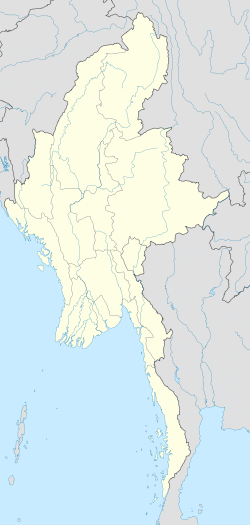Shwe Kokko Myaing
ရွှေကုက္ကိုမြိုင် Shwe Kokko | |
|---|---|
 Shwe Kokko in 2022 | |
| Coordinates: 16°49′13.7″N 98°31′51.3″E / 16.820472°N 98.530917°E | |
| Country | |
| State | |
| District | Myawaddy District |
| Township | Myawaddy Township |
| Population | |
| • Religions | Buddhism and Christianity |
| Time zone | UTC+6.30 (MST) |
Shwe Kokko Myaing (Burmese: ရွှေကုက္ကိုမြိုင်; lit. 'golden raintree forest'), commonly known as Shwe Kokko (Burmese: ရွှေကုက္ကို), is a town in Myawaddy Township, Myawaddy District in the Kayin State of south-east Myanmar.[1] Shwe Kokko lies on the left (western) bank of the Moei River (Thaungyin River), facing Thailand to the east.[2] The town is located 20 kilometres (12 mi) north of Myawaddy.[3] In recent years, Shwe Kokko has evolved into an organized crime and human trafficking hub, due to the Burmese government's limited reach and oversight in this remote area.[4][5] Chinese-led development projects in Shwe Kokko, including Yatai New City, have been involved in illegal gambling, human trafficking, extortion, and cyber scam operations.[4][6][7][8] As Cambodia intensified its crackdown on illegal online gambling in 2019, Chinese crime syndicates and casino operators have found a new base in Myanmar's peripheral border areas.[7][9]
As of May 2022, 1,225 Chinese nationals were legally residing in Shwe Kokko, and thousands of illegal Chinese workers migrate to the village for work.[4] Shwe Kokko is the destination of many Asian human trafficking victims, from countries such as Thailand, Cambodia, Laos, Malaysia, Hong Kong, Taiwan, India and Philippines, who have been forced to work in Shwe Kokko in online scam operations run by Chinese crime syndicates, lured by the prospect of romance and well-paying jobs.[10][5] In September 2022, over 300 Indian nationals were reported to be held hostage in Shwe Kokko.[11]
Since the Karen BGF cut ties with the Tatmadaw and rebranded itself to the Karen National Army, many of these centers clamped down on abusive working conditions under the threat of a potential crackdown from anti-Junta forces.[12] However, the scamming workforce and targets shifted to English speakers.[12] Stricter security measures largely impede workers from escaping, with rescued Ugandan victims alluding to slave-like conditions.[12]
- ^ Gambling Away Our Lands: Naypyidaw’s "Battlefields to Casinos" Strategy in Shwe Kokko (PDF). Karen Peace Support Network. 2020. Archived from the original (PDF) on April 7, 2023.
- ^ "Shwe Koke Ko". Google Map. Retrieved 11 February 2018.
- ^ Han, Naw Betty. "How the Kayin BGF's business interests put Myanmar at risk of COVID-19". Frontier Myanmar. Archived from the original on June 9, 2023. Retrieved 2020-06-19.
- ^ a b c "Scam City: How the coup brought Shwe Kokko back to life". Frontier Myanmar. 2022-06-23. Archived from the original on September 22, 2023. Retrieved 2023-03-02.
- ^ a b "Malaysian dad pleads help for scam victims after son died". AP NEWS. 2022-09-21. Archived from the original on December 4, 2022. Retrieved 2022-09-24.
- ^ "With conflict escalating, Karen BGF gets back to business". Frontier Myanmar. 2021-05-13. Archived from the original on December 24, 2023. Retrieved 2023-03-02.
- ^ a b Clapp, Priscilla; Tower, Jason (2022-11-09). "Myanmar's Criminal Zones: A Growing Threat to Global Security". United States Institute of Peace. Archived from the original on October 19, 2023. Retrieved 2023-03-02.
- ^ "Cambodia scams: Lured and trapped into slavery in South East Asia". BBC News. 2022-09-20. Archived from the original on November 24, 2023. Retrieved 2023-03-02.
- ^ Tower, Jason; Clapp, Priscilla A. (2020-04-20). "Chinese Crime Networks Partner with Myanmar Armed Groups". United States Institute of Peace. Archived from the original on September 22, 2023. Retrieved 2020-06-19.
- ^ Aung Zaw (2023-02-27). "Shwe Kokko - A Secret Chinese City". Mizzima Myanmar News and Insight. Archived from the original on May 21, 2023. Retrieved 2023-02-27.
- ^ "Hundreds of Indians Reportedly Trafficked to Myanmar by Cybercrime Operations". The Irrawaddy. 2022-09-22. Archived from the original on December 4, 2022. Retrieved 2022-09-24.
- ^ a b c Cite error: The named reference
backbuswas invoked but never defined (see the help page).
